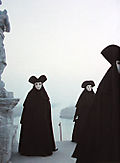Not quite so sure I won't try to become a Jungian analyst; we'll see. Of course, in any major decision it is good to give up on it at one point, at least... but despite my concerns about age, health, time, cost, logistics, appropriateness, and what might be my underlying (possibly suspect, narcissistic, inflated or unrealistic) reasons for wanting this, the only concern that really stands in my way is wondering whether I'm only doing this in order to avoid writing The Book.
In any case: I am much concerned about anima/animus stuff, relations, the way I connect to others. I need to be concerned about those things – as school revs up again I'm finding myself amazingly hostile, angry, resentful about the tedious things that are thrown at us in e-mails, meetings, and tedious presentations by outside consultants. It is as though we start out the school year with the most nonsensical, oppressive and bureaucratically misguided parts of our jobs – and because this is the UK, where the government runs the universities, there are very, very many of those.
I did, after all, live at least partly in the business world during the eighties and early nineties, and left it behind because it was so airless and ridiculous – there is a way in which all bosses become pointy-haired after a time. The fact that British universities are increasingly run by, and in the favorite ways of, bureaucratic busybodies is a seriously unpleasant aspect of life here, even more than the weather.
So I'm cranky, and being difficult to my colleagues – at points, very difficult indeed. I am not nice when I don't want to be.
Somewhere among all this, and a crowd of half-forgotten dreams that seem to be trying to push me in various directions, and a beautifully thoughtful, extended series of long messages on Facebook with an admired gay poet of the 1980s, I'm thinking of many things. One of them is connected to the Jungian, to the psychological, to the relational – the way that some major stage works, operas and plays, don't mean much of anything to me; and my attempt to figure out why, on psychological rather than aesthetic grounds.

For instance, neither Mozart's
Don Giovanni nor Shakespeare's
Hamlet, though both are supposed to be the greatest works by the greatest artists, has ever really gotten through to me at all. Yes, I get all the ideas; but they both seem strange, flat and dead, and simply unimportant to my world.
With Mozart, it's certainly not the nature of opera itself: I love Nozze di Figaro more than many things in the world, and I enjoy the fluff of Cosí fan tutte, even if the plot degenerates into drivel. I'll admit I'm not as enamored as Zauberflöte as many are, but perhaps that is because the childlike doesn't mean much to me. But no – with Zauberflöte and Don Giovanni, there is a sense of being forced to care about something that is ultimately too heterosexual, too concerned with the endless, tiresome war between the men and the women...
but then isn't that just as true of Nozze and Cosí? What am I missing in these works? Or is it significant that Nozze and Cosí are more from the womens' viewpoint – that both seem to be taking place, much of the time, in women's bedrooms?
As for Shakespeare: given how much I love Lear, Romeo & Juliet, The Tempest, and above all and more than anything A Midsummer Night's Dream, why does Hamlet leave me so entirely cold? And Macbeth is nearly as bad, after the witches leave the stage. (This can't entirely be a gay thing – Patrick loves the Scottish play, but maybe that's because he did it in school and knows it so much better.)
The problem with Hamlet, more than any of these, is that it is accurately described as intellectual, obsessed with death, tragical, rhetorical, complicated – doesn't that sound like something I would like? And I've tried repeatedly; but it just falls flat for me. I cannot see why it is greater than the other plays, and I can barely see why it is worth producing at all.
Of course I can't stand Gravity's Rainbow either, despite enjoying V and The Crying of Lot 49. Way too much war stuff, olive drab, yuck. Or Beethoven piano sonatas – though I love practically all the symphonies, even the wallfowers 4 and 8, the piano sonatas seem so heavy with male bombast – when Bennett plays them in the afternoon down the hall from my office, I can admire his passion for them, but I find the harmonies of that exaggeratedly male universe incredibly tiresome.
Is this, then, all something about anima relations – or animus relations – or the Double, or one of the other attempts that have been made to make sense of archetypes in the gay mind? (Which is one of the big places where Jung's often very heterosexual theories run into some trouble – and which is a place where there has been a great deal of discussion, as so many famous Jungians are gay men or lesbians.)
Is this – at the greatest depth and with the greatest resonance – a guy thing? Or a gay thing?....
Such a little difference a vowel makes.
A week since I've written in a journal, or done any spontaneous morning writing (see Dorothea Brande's famous 1934 book for instructions); and more since I've written here.